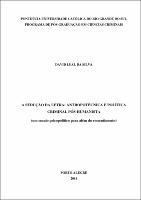| Share record |


|
Please use this identifier to cite or link to this item:
https://tede2.pucrs.br/tede2/handle/tede/6916| Document type: | Dissertação |
| Title: | A sedução da letra : antropotécnica e política criminal pós humanista : (um ensaio psicopolítico para além do ressentimento) |
| Author: | Silva, David Leal da  |
| Advisor: | Gloeckner, Ricardo Jacobsen |
| Abstract (native): | A presente pesquisa tem por objetivo abordar a tendência da política criminal norte-americana em adotar a técnica atuarial como instrumento de gestão eficiente de grupos sociais indesejados. O emprego de instrumentos de medição de risco torna-se o mecanismo preferencial para a formulação de prognósticos que objetivam potencializar a gestão da criminalidade com base no perfil do criminoso. Essa é a chamada política criminal atuarial. Desvinculada dos ideais de regeneração disciplinar, apresenta-se como uma prática de inocuização dos irrecuperáveis. A configuração do sistema de justiça criminal norteamericana encontra ressonância noutros países do globo, justificando este estudo comparativo, bem como suas implicações no cenário brasileiro. Esses sintomas pertencem a um quadro maior, conduzindo ao estudo do acaso do humanismo e ao estudo da antropotécnica. Desde os gregos, o humanismo pertence às técnicas de domesticação do humano pela leitura. Atualmente, a cultura humanista é declarada ineficiente enquanto técnica domesticadora. Daí a hipótese de a genética tornar-se a mais eficiente antropotécnica da atualidade. Nesse sentido, uma perspectiva teórica alargada da convivência em coletividade é apresentada com a leitura do projeto Esferas de Sloterdijk, que demonstra a necessidade de compreender o modelo de governo, que concebe não só a vida humana numa ausência de atributos metafóricos com a preponderância biológica, mas a articulação de estratégias políticas que identificam a sociedade um corpo biológico. O que está em jogo, aqui, diz respeito a uma reorientação do pensamento político criminológico a partir da técnica. |
| Abstract (english): | The present study aims to assess the trend of nortemericana criminal policy to adopt the actuarial technique as a tool for efficiently managing unwanted social groups. The use of measuring risk becomes the preferred mechanism for formulating predictions that aim enhance the management of crime based on the criminal profile. This is called the actuarial criminal policy. Divorced from the ideals of discipline regeneration, presents itself as a practice of inocuização of sunk. The configuration of the North American criminal justice system finds resonance in other countries of the globe, justifying this comparative study as well as its implications in the Brazilian scenario. These symptoms belong to a larger framework, leading to the study of humanism and the chance to study antropotécnica. Since the Greeks, humanism belongs to the techniques of taming the human for reading. Currently, the humanist culture is declared inefficient while domesticating technique. Hence the hypothesis of genetic become more efficient antropotécnica today. In this sense, an expanded living in collective theoretical perspective is presented with reading Sloterdijk's Spheres project, which demonstrates the need to understand the model of government, which sees not only human life in the absence of metaphorical attributes with biological preponderance but the articulation of political strategies that identify the company a biological body. What is at stake here concerns a reorientation of criminological political thought from the technique. |
| Keywords: | POLÍTICA CRIMINAL HUMANISMO CRIMINOLOGIA DIREITO |
| CNPQ Knowledge Areas: | CIENCIAS SOCIAIS APLICADAS::DIREITO |
| Language: | por |
| Country: | Brasil |
| Publisher: | Pontifícia Universidade Católica do Rio Grande do Sul |
| Institution Acronym: | PUCRS |
| Department: | Faculdade de Direito |
| Program: | Programa de Pós-Graduação em Ciências Criminais |
| Access type: | Acesso Aberto |
| URI: | http://tede2.pucrs.br/tede2/handle/tede/6916 |
| Issue Date: | 13-Jan-2015 |
| Appears in Collections: | Programa de Pós-Graduação em Ciências Criminais |
Files in This Item:
| File | Description | Size | Format | |
|---|---|---|---|---|
| DIS_DAVID_LEAL_DA_SILVA_PARCIAL.pdf | Texto Parcial | 143.25 kB | Adobe PDF |  Download/Open Preview |
Items in DSpace are protected by copyright, with all rights reserved, unless otherwise indicated.




